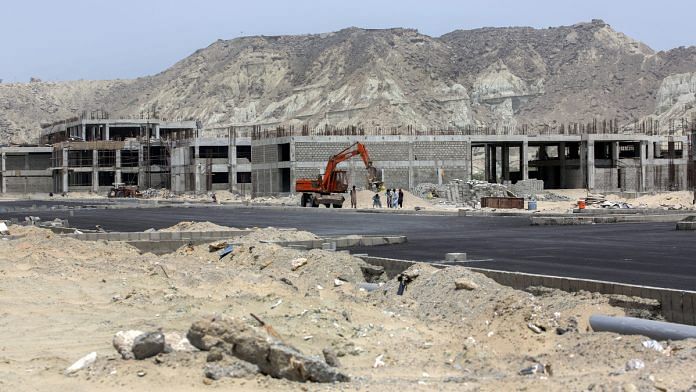New Delhi: Amid mounting pressure from China over long delays in the completion of key projects in the China-Pakistan Economic Corridor (CPEC), the Pakistan Army has taken control of the newly-established nodal CPEC Authority (CPECA).
CPEC is seen as a lifeline for a dwindling Pakistan and is the cornerstone of China’s flagship Belt and Road Initiative (BRI). But over the past couple of years, with the Pakistani economy hitting a deep economic crisis, the timelines for several CPEC projects have been derailed.
Now, with the appointment of retired three-star Pakistani Lt Gen Asim Saleem Bajwa as the head of CPECA, the Army has stepped into the official institutional structure of CPEC.
Analysts argue that this is the first instance wherein the Army has gotten directly involved in the $62-billion project.
The development comes even as economists highlight the odds in meeting the conditions imposed by the International Monetary Fund (IMF) on Pakistan for a $6 billion bailout and reviving CPEC projects at the same time.
Also read: No cabinet debate & nod from President — why Pakistan SC suspended Army chief’s extension
CPEC has come to a halt
“Only half of the announced $62 bn-worth of projects in Pakistan are under way as Islamabad scales back its financial commitments while it implements a $6bn IMF bailout package,” noted a report in Financial Times last week.
In the last year, a whole of set of Pakistani politicians and analysts have accepted that many of the CPEC projects have come to a halt.
For instance, Jan Muhammad Buledi, former spokesman of the Balochistan government, said in September that “projects pertaining to the construction of an airport and thermal power stations have come to a grinding halt”.
A large section of the corridor passes through Balochistan, where the Gwadar port is also located.
Meanwhile, the Chinese Consul General in Karachi, Wang Yu, has also complained about “bureaucratic delays” in the implementation of key CPEC projects.
Pakistan’s economy has had to grapple with mounting debt over the last couple of years, a nearly bankrupt federal government, and a severe balance of payments crisis. In such a scenario, the key hindrance to CPEC has been Pakistan’s inability to accept more Chinese debt.
As a consequence, now the country has to make trade-offs between implementing the IMF-imposed structural reforms and carrying on with the CPEC.
But beyond these delays, there seems to have been a more fundamental shift.
“CPEC, which was until recently being projected as a game-changer for the country and the region, has lost its attraction in policy discourse,” Muhammad Amir Rana, director, Pakistan Institute for Peace Studies, wrote in Pakistani daily Dawn in April.
“In the process of rationalisation of CPEC projects, Pakistan has put many projects on hold, thus discouraging private Chinese companies and individuals from investing in the special economic zones (SEZs),” added Rana.
Also read: Pakistan struggles under the weight of CPEC but puts on brave face against US criticism
Acting under Chinese pressure
The Pakistani regime has been under increasing pressure from Beijing over CPEC.
Tensions were apparent during the Pakistan-China Joint Cooperation Committee (JCC) meeting on 4-6 November. JCC is the highest decision-making body within the CPEC institutional structure.
According to reports, there was a reported lack of enthusiasm from the Chinese side. While the Pakistani negotiators offered attractive investment options to China, the latter refused to make any new financial commitments until the previous projects were completed.
Chinese disinterest persisted even after the Imran Khan government created the autonomous CPEC Authority in October as a means to appease the Chinese government. This idea had been turned down by the previous Nawaz Sharif government.
CPECA was created via an ordinance to bypass the Pakistani parliament. The new body aims to enforce quick completion of CPEC projects and facilitate inter-ministry coordination.
However, as even this move failed to impress the Chinese government, Lt. General Asim Saleem Bajwa has been named the CPECA head — to officially induct the Pakistani Army in the CPEC institutional structure. Army is the strongest actor in the Pakistani state.
Taking control of CPEC
In the past, there have been several incidents of the Pakistani Army being involved in CPEC. In May, the Army had announced its decision to raise a special units division to protect CPEC projects. The top Army leadership has also held meetings with Chinese authorities regarding CPEC.
But the latest appointment marks the first occasion when a former officer would be a part of the CPEC institutional structure. And the scale of Pakistani Army’s involvement in CPEC can be gauged by two underlying factors.
“This new apex institution for the CPEC will be entrusted with not only far reaching autonomy but also vast financial and administrative powers,” noted Siegfried O. Wolf, director of Swiss think-tank South Asian Democratic Forum, in October.
Moreover, with Bajwa at the helm of CPECA, analysts claim that the Army would have unrestricted control over CPEC now. Bajwa was formerly the director general of the Inter-Services Public Relations and led the Southern Command.
“It appears that the aim of the current government is not only to appease the military but also to reduce Chinese unease over the low pace of the CPEC’s implementation and other unfortunate trends. These were definitely two determining factors in the decision to set up the ‘CPEC Authority’,” wrote Wolf.
Also read: Pakistan struggles under the weight of CPEC but puts on brave face against US criticism




CPEC is lifeline for the economics of future for China and Pakistan.Therefore to be completed under all odds and beware that CIA will screw there ass off to stop it by many of there nefarious acts.Long live CPEC n Pak China friendship.